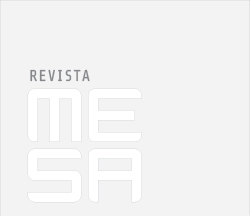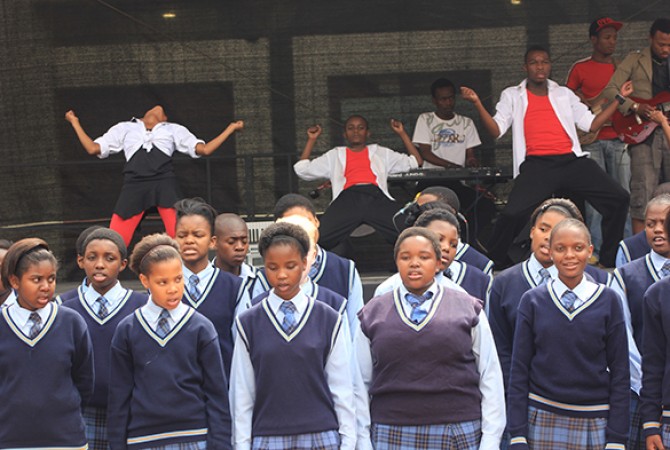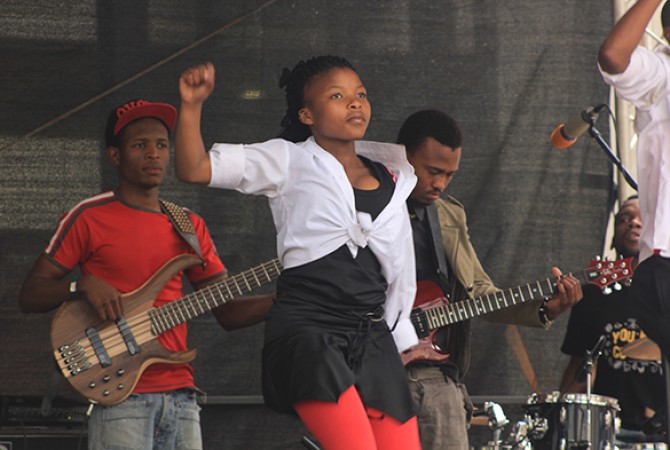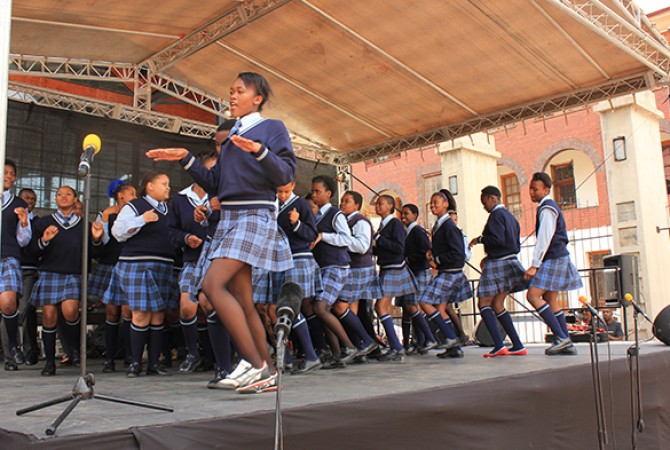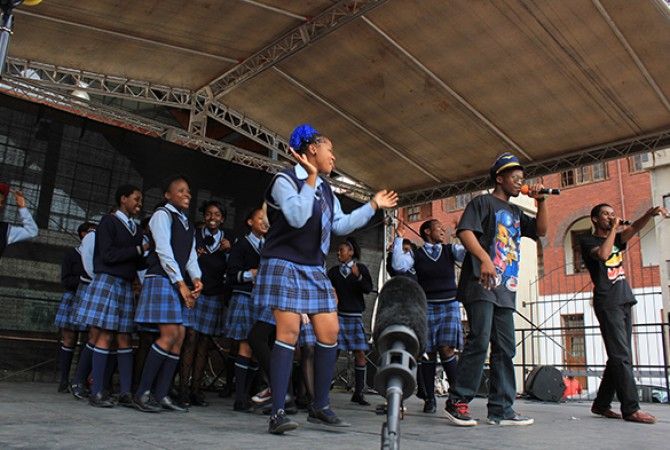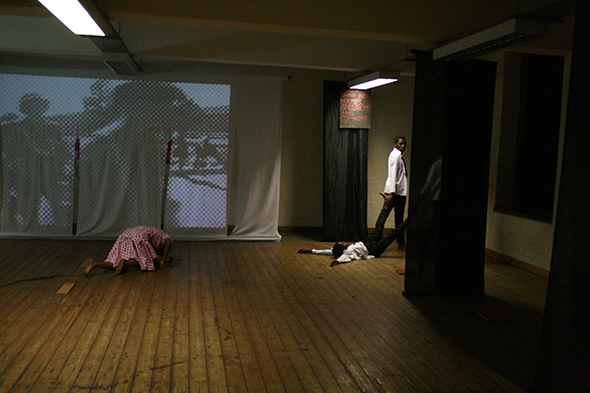
A scene from Movement Mandela, a dance piece performed by Nqobile Khumalo, Neo Doctor Ncube, Wesley Hlongwane, Emma Ramshala and Lerato Makopo with a 7 month choreography by Mike Machaya. Originally performed with a live band at the point gallery on the occasion of former Treason Trialist and struggle fighter Ahmed Kathrada on 25 June 2011, Movement Mandela was performed three months later in front of a smaller audience for educational film documentation, 24 September 2011, The People’s Studio, The Drill Hall. Johannesburg. Photo: Rangoato Hlasane
Keleketla! After School Program (2008-present): Access to the use of literature, arts and media tools for education & life
k!kollage (excerpts, revisions and citations from texts written by/about/for Keleketla!
The Keleketla! After School Program (KASP) was established in 2008 as a youth learning space that relates history and contemporary issues to lived experience. The program aims to engage youth in the critical analysis of contemporary social, political and economic issues of the city, the country and the continent. KASP has gone through “phases” of development, each phase a scaffold of the previous, as well as a conversation with practices from the outer world.
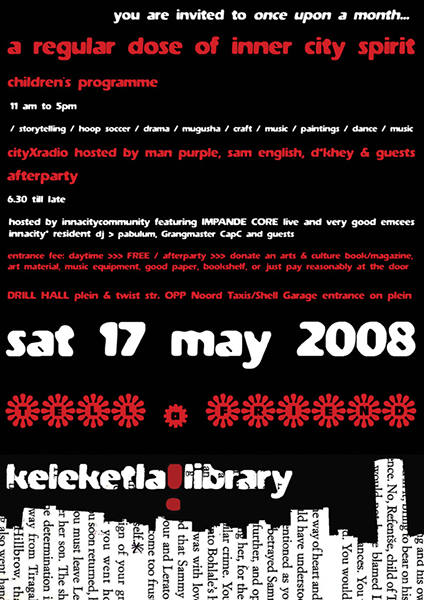
From the beginning, the library opened itself to a range of approaches, and sought to create a public platform to share its processes. Notably, the drama group that performed on this day shared a production that looked at migration and xenophobia a day before the so-called ‘xenophobic’ violence experienced by South Africa on 18 May 2008. Design: Rangoato Hlasane
This scaffolding approach of long-term collaborative, constructive and collective engagement resulted from a dissatisfaction with the heritage-site tendency to bus in young people for a walking, talking-head educational tour. Usually this style of heritage education clocks in numbers as a benchmark of reach, albeit once-off. Instead, Keleketla! sought a deeper process in which a smaller number of interested young people explored heritage through creative processes, punctuated by sustained dialogue with artist-facilitators, invited historians and most importantly, peers. In this way, they investigated history and issues of identity politics and found a space for interrogation through co-produced works of art. Most importantly, the immediate community, composed of first and foremost library members, got to understand heritage as a relevant infrastructure in the physical and conceptual sense.
2008–2010
This period made up the truest activism, a labor of love for all involved, and possibly the deepest moment of a real exchange. During this time, the co-founders had just started working from the Drill Hall site with access to a relatively large space to enable programs.1 The co-founders extended a call to Johannesburg networks and new partners, exchanging use of space for the provision of educational programs with young people, a growing demand that paralleled book-lending. During this time, there was very little “screening” for implementation of programs, and initiators/facilitators pretty much enjoyed total freedom with regard to projects.
During this period we did it all; from finger painting to a Skype intercontinental concert/conference; from book-for-door-as-entry into a live music performances to the Stokvel/auction (see introductory text for more info) that raised over R30.000 in one night2; pirate radios to mobile libraries when Newtown3 still tolerated hustler-led flea markets to GazArt4 when Maboneng, one of Johannesburg’s recent gentrification projects, was only at Phase 2. Briefly, Keleketla! was autonomous, a position informed by the open-ended creative freedom that maverick Steve Kwena Mokwena5 called an “angazi” (I don’t know) practice in Johannesburg and elsewhere.
2010–2012
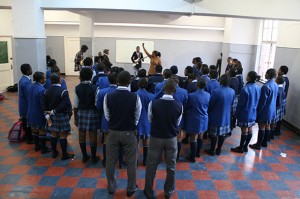
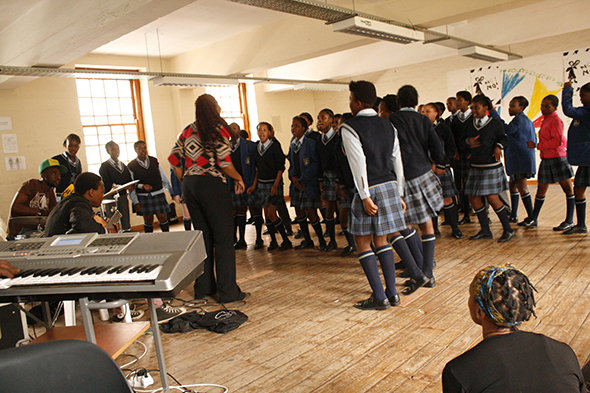
Teboho Semela leads a rehearsal at Freedom Community College and Keleketla! Library with members of the school choir and commissioned young music professionals. The rehearsals alternated between the school’s premises and the Drill Hall, both separated by three city blocks along De Villiers Street. August 2012. Photos: Malose Malahlela and Rangoato Hlasane
Thanks to a grant from the National Lottery Distribution Trust Fund of South Africa, the after-school program benefited from a relatively well-resourced environment to reflect on practice. Keleketla! implemented three KASP projects per annum between 2010 and 2012. We identified potential facilitators after we established the interests of the participating youth. Highly consultative, the project always involved focus groups with youth to identify their interests. The method was always that of school youth, teachers and young practitioners defining a project together, searching for relevance.
Teachers were called in for workshops to explore ways that our program linked to and contributed to the curriculum. With regard to Drill Hall, our program engaged the politically charged site to explore specifically the Grade 11 and 12 History modules in South African high schools. This was achieved through dialogue over a period of approximately ten weeks. The dialogue was interactive and centered on heritage and real life experiences between youth (high school learners and young practitioners).
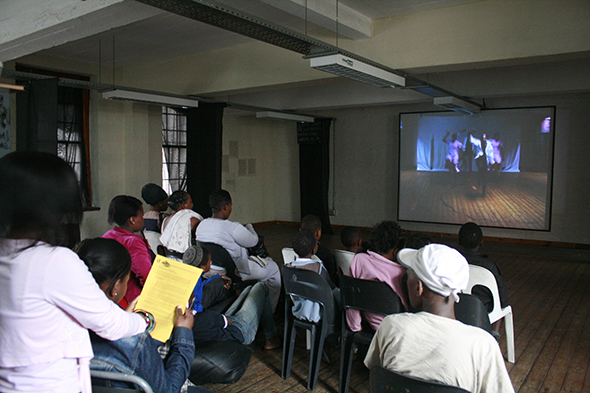
Third public performance of Movement Mandela, an interdisciplinary piece by Wesley Hlongwane, Nqobile Khumalo, Neo Ncube, Lerato Makopo and Emma Ramashala choreographed by Michael Machaya and video projection by Thenjiwe Nkosi. 24 September 2011, Keleketla! Library, The Drill Hall, Johannebsurg. Photo: Rangoato Hlasane
Furthermore, the dialogue led to creative output in the form of visual art, audio, text, performance, and other expressive tools open to parents, teachers and the general public (including online). In fact, a bulk of the experiences from this phase of the after-school program did not sit well within disciplines; there was a great deal of cross-pollinating forms and ideas. Ephemeral and lasting, here is an excerpt from the forthcoming publication 58 Years to the Treason Trial (2014):

Untitled is a piece of physical theatre choreographed by Nyaniso Dzedze and performed by the then 2012 KASP members in contemporary dance and movement; Nqobile Khumalo, Talia Ndlovu, Wesley Hlongwane, Neo Ncube, Grace Kasuza, Langalibalele Mathuthu, Cinderella Khoza, Simphiwe Shange and Emma Ramashala. The piece was the concluding moment of the walk from Constitution and the 8 week youth-led Teen Talk programme, 23 June 2012, Keleketla! Library, The Drill Hall, Johannesburg. Photographer unknown.
One very significant project to emerge out of the Q&A sessions and KASP is Teen Talk, a youth forum in the format of a talk show, produced by KASP members. The project was initiated by Emma Ramashala, member of the dance group and one of the longest standing members of KASP. Teen Talk was supported/commissioned by Medicins Sans Frontieres/Doctors Without Borders (MSF) as a school workshop component to the anti-xenophobia campaign, Solidarity for Survival, held at the Constitution Hill between May and June 2012. The nine-member-strong crew worked under the guidance of experienced mentors from diverse fields including research, TV & Film production and visual arts. Furthermore, the show invited experienced practitioners as guests, ranging from activists on Pan-African Diaspora issues to public health practitioners. The audience consisted of a diverse group of youth living in greater Johannesburg. As an appropriation of a youth magazine program, the shows incorporated contemporary dance, poetry and music charged with fresh perspectives and powerful expressions. Thus, the shows produced a rich dialogue on migration through media processes and tools.”
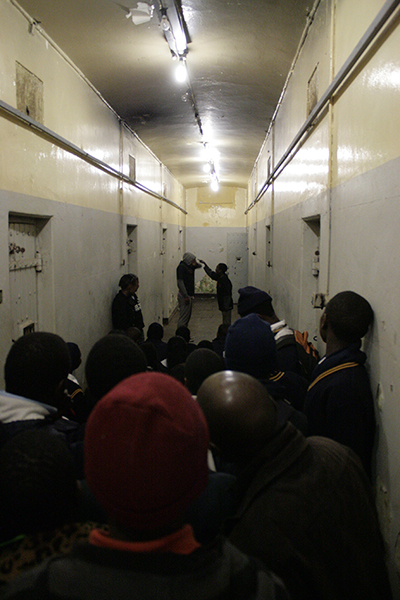
Mission Why, a physical theatre performance on ‘xenophobia’ by mentee Wesley Hlogwane with mentor, Nyaniso Dzedze at the Constitution Hill on 16 June 2012, during the youth-led Teen Talk public forum. Photo: Jet Khumalo
I have been a part of many workshops in the past but Teen Talk was a different workshop altogether. Why am I saying so? It’s because other workshops were directed and led by adults and barely took into consideration the youths’ perspectives on certain issues that were discussed. Teen Talk was/is the brainchild of a youth (Emma) and the team on its own consisted of mostly youth. We had adults amongst us, but whatever decision taken was made as a team, because everyone’s voice, no matter how small, mattered. In Teen Talk we basically discussed how the 2008 xenophobic attacks affected us and how we as South Africans are learning from our mistakes, to try and avoid repeating the same mistakes again.”
Tammy Trish Sibanda,
Teen Talk crewmember and co-presenter
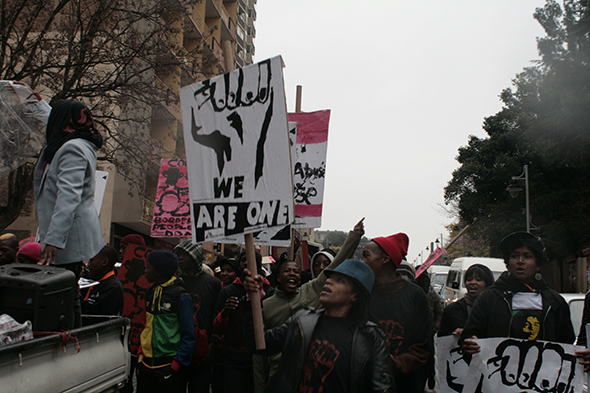
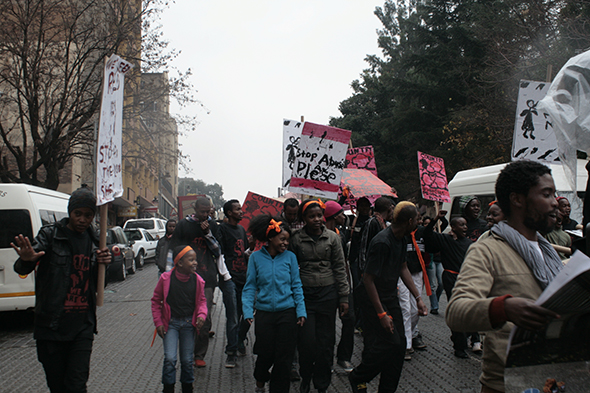
We Are One! walk/march from the Constitutional Hill to the Dril Hall on 23 June 2012 to address migration, xenophobia and access to health care for all who live in South Africa. Photo: Reneilwe Mathibe
KASP is a space to enhance intellectual and social experiences of youth through art and media tools and processes, with public outcomes that engage with local and global themes in ways that contribute to learning and personal expression. The consistent programming in this phase, as opposed to once-off activities, enabled sustained growth through scaffolding of information, i.e. information specific to a shared discourse. The consistent programming further attracted members to return year after year, some moving into higher education with strong ties to Keleketla! Library. Thus the program sustained and problematized a “community.”
A mix of sounds from the school choir and band collaboration on the intersection of hymns and protest songs, using the participants’ practices in music as a starting point of matching interests. The Freedom Community College worked on an eight-week music project with young professionals Tito Zwane (bass guitar), Simphiwe Tshabalala (drums), Zweli Mthembu (rhythm guitar), Zithobile Sibiya (keyboard), and conductor Teboho Semela (violin). Between September and October 2012, Keleketla! Library and Freedom Community College, Johannesburg. Recorded and mixed by Malose Kadromatt Malahlela.
KASP contributes to high school education and develops young thinkers and problem-solvers. It builds talent and skills in arts methods and critical thinking. Our after-school program thus contributes to not only the demands of high school education, but also develops voice and self-articulation in a city/environment/history of outsider representation. The obvious mark of the project’s five years of action and thought was in publication of a book – in all, 100 pages – of an archive that retraces, reflects on and makes proposals into and out of art, education, life, art in education, education in art, and art in life.
2013-Present
Keleketla!’s tenancy at the Drill Hall is a precarious inheritance from a decade ago, a non-arrangement by the City of Johannesburg and its development agencies with regard to the ownership, maintenance and development of the site towards a social, cultural and heritage mandate for the immediate community and Gauteng at large. In 2013, this took a toll with regard to the security of sustained programming for Keleketla!.
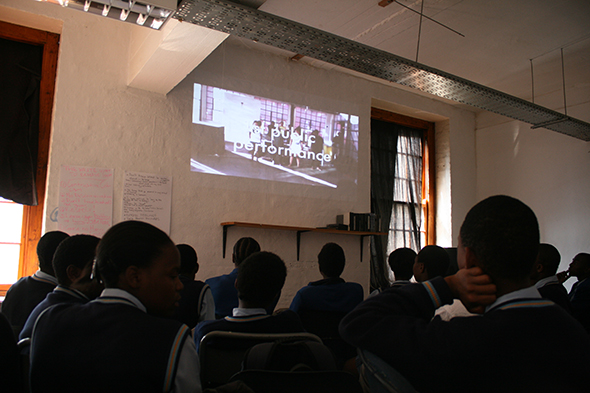
Freedom Community College grade 11 history class viewing the first documentation of the first public performance by the then Keleketla! After School Programme in dance and movement group’s piece titled Movement Mandela. This session was one of the early stages of creating and sharing owned content parallel to traditional library collections of books. 14 September 2011, Keleketla! Library, The Drill Hall, Johannesburg. Photo: Rangoato Hlasane
Extensive conversations with members of our partner school, Freedom Community College, led to the opening of a shared underused space at their De Villiers Street premises for projects invested in education and exchange. This is an open relationship that grows organically with no clear entry and exit signposts. It is reciprocal and hinges on need and negotiation.
During this time, a new knowledge exchange relationship was established with Kgagatlou Secondary School in Ga-Mphahlele, Polokwane in Limpopo province, South Africa. A kind of a matchmaking game, Keleketla! hopes to form a working relationship between Freedom Community College and Kgagatlou Secondary School, learning environments at the opposite sides of the spectrum, yet with so much in common; rural and urban. The forthcoming 58 Years to the Treason Trial features pages with content created by both partner schools. During all this time, no one really knows whether “Keleketla! is still at the Drill Hall or what?” In a sense, as Talib Kweli announces6, “We have only just begun; the journey is far from done.”
_
1 Drill Hall is home to Keleketla!. Built on the ruins of a “native prison” in 1904 as a military base buttressing British colonial power after the Anglo-Boer War, the Drill Hall was involved in the marshalling of forces in both World Wars and the quelling of civil unrest and various miners’ strikes in the first decades of the twentieth century. In 1956, it was turned into a courtroom for the Treason Trials. In the 1970s and 80s, it served as an important site for the conscription of young white men into active duty in the border wars and the suppression of internal resistance to Apartheid. Abandoned by the Apartheid military in the early 1990s, it was invaded by squatters, leading to two fires and a number of fatalities. In 2002-2004, the Drill Hall was redeveloped as a heritage site through the efforts of the City of Johannesburg. While the ambitions of the city are a story for another day, it is on these layered grounds that a “library” was founded and evolves on a daily basis.
2 South African Rand = .089 dollars (2,691 USD) .215 Reais (6,468 BRL)
3 Newtown, formerly Newtown Cultural Precinct is one of Johannesburg’s earliest, artist-led cultural spaces dating back to liberation struggle days. Home to the Market Theatre, Museum Africa and a host of creative industry training centers, Newtown also hosted the first and second Johannesburg Biennials. More than that, Newtown is known as a space that gained its reputation as an artists’ place through an organic development led by artists; neither by the state nor property developers. However, the place has been sold to private investors for a “mixed use…” following recent gentrification projects in Johannesburg, such as sections of Braamfontein and Maboneng Precinct.
4 “Gazart is an alternative DIY art making and exhibition model that references the colloquial practice of gazating/koezating: pooling limited resources to fulfill something common to a collective” founded by Johannesburg-based artists Molemo Moiloa and Nare Mokgotho, sharing similar ethos to Stokvel and SKAFTIEN.
5 Founder director of the Johannesburg-based interdisciplinary space, The Afrikan Freedom Station Steve Kwena Mokwena uses the paradox “angazi” (I don’t know) to imbue an unwavering spirit of creation at his space.
6 “The Manifesto”, 1998, Reflection Eternal (Talib Kweli & DJ Hi-Tek), Rawkus Records


